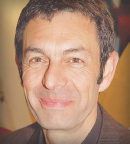In addition to covering the biggest news from the meeting in other articles, The ASCO Post brings you these brief news summaries of notable abstracts in multiple myeloma, lymphoma, and leukemia.
Maintenance Daratumumab in Multiple Myeloma
Part 2 of the CASSIOPEIA trial in 866 patients with newly diagnosed multiple myeloma demonstrated benefit for maintenance daratumumab after treatment with bortezomib, thalidomide, and dexamethasone (V-Td) with or without daratumumab and autologous stem cell transplant. At a median follow-up of 35 months, median progression-free survival was not reached in patients receiving daratumumab, whereas it was 46.7 months with observation (hazard ratio [HR] = 0.53; P < .0001), reported Philippe Moreau, MD, of the University Hospital Hotel Dieu in Nantes, France.1

Philippe Moreau, MD
Part 2 of CASSIOPEIA compared daratumumab at 16 mg/kg every 8 weeks (a reduced frequency compared to standard dosing) vs observation for a fixed duration of 2 years in patients who achieved at least a partial response to induction/consolidation therapy in Part 1 of the trial. In Part 1, multiple outcomes were improved in patients receiving daratumumab plus V-Td vs V-Td alone.
The primary endpoint of Part 2 was progression-free survival after the second randomization. This was significantly improved for patients not receiving daratumumab as induction/consolidation who then received daratumumab maintenance vs observation, but not for patients initially treated with daratumu-mab in Part 1, Dr. Moreau reported.
In addition to the progression-free survival benefit, daratumumab maintenance was associated with multiple improvements in the aras of complete response, minimal residual disease (MRD) negativity, time to disease progression, and second progression-free survival.
“Prespecified analysis showed significant interaction between maintenance and induction/consolidation therapy,” Dr. Moreau said. “In addition, updated results from Part 1 support the early use of daratumumab-containing regimens as induction/consolidation.”
Tisagenlecleucel in Follicular Lymphoma
Tisagenlecleucel achieved complete responses in two-thirds of adults with heavily pretreated follicular lymphoma in the single-arm, phase II ELARA trial.2 The overall response rate in these patients with relapsed/refractory disease was 86%, and the complete response rate was 66% on treatment with tisagenlecleucel, a chimeric antigen receptor (CAR) T-cell therapy.
At a median follow-up of 11 months, median duration of response, progression-free survival, and overall survival were not reached. At 6 months, the rate of progression-free survival was 76%.
“These data indicate that tisagenlecleucel is an effective therapy for patients with relapsed or refractory follicular lymphoma, including high-risk subgroups,” said Stephen J. Schuster, MD, of the University of Pennsylvania Abramson Cancer Center, Philadelphia.

Stephen J. Schuster, MD
ELARA was a phase II, international, single-arm trial that enrolled 98 patients with follicular lymphoma treated with at least two prior lines of therapy or for whom autologous stem cell transplant was not effective. Among these patients, 97 received an infusion of tisagenlecleucel and were evaluable for safety; 94 were evaluable for efficacy. All patients had grade 1–3A follicular lymphoma with no evidence of histologic transformation. Prior anti-CD19 therapy or allogeneic transplant was not allowed.
Following high-dose chemotherapy with fludarabine plus cyclophosphamide, patients received an infusion of tisagenlecleucel. About 20% were treated as outpatients.
Treatment-related adverse events were reported in 77.3% of patients. Grade 3 or 4 treatment-related adverse events occurred in 45.4% and serious adverse events occured in 28.9%. Three deaths occurred during the trial but were not considered associated with treatment. Fifty percent of patients treated with tisagenlecleucel experienced cytokine-release syndrome at a median of 4 days after treatment. These events were deemed low grade. Another 9.3% of patients had immune effector cell–associated neurotoxicity; one event was grade 3.
The majority of cytokine-release syndrome events (75%) and 100% of the immune effector cell–associated neurotoxicity events were reported in patients with bulky disease. These events resolved with appropriate management. There was no association between dose level and cytokine-release syndrome or immune effector cell–associated neurotoxicity.
CAR T-Cell Therapy in ALL
High and durable response rates were seen with the CAR T-cell therapy brexucabtagene autoleucel in heavily pretreated adults with relapsed/refractory B-cell–precursor acute lymphoblastic leukemia (B-ALL), according to results of the phase I/II ZUMA-3 study.3
At a median follow-up of 16.4 months, 71% of patients had a complete response or complete response with incomplete hematologic recovery. A majority of responses were associated with achieving undetectable MRD.
“The efficacy and safety profile support the promising role of brexucabtagene autoleucel to provide long-term clinical benefit in adults with relapsed B-cell ALL,” said Bijal Shah, MD, of Moffitt Cancer Center, Tampa, Florida.

Bijal Shah, MD
The phase I portion of the trial achieved an overall rate of complete response/complete response with incomplete hematologic recovery in 83% of patients, with a manageable safety profile. The recommended dose going forward was 1 × 106 CAR T cells/kg.
Phase II included 71 patients with relapsed/refractory B-ALL. A total of 55 received brexucabtagene autoleucel. Of these patients, 47% had been treated with three or more prior therapies.
In phase II, the rate of complete response/complete response with incomplete hematologic recovery was 70.9% (complete response rate of 56.4%). Among responders, 97% were MRD-negative, and the median time to response was 1.1 months. Ten patients went on to allogeneic stem cell transplant (9 with complete response/complete response with incomplete hematologic recovery). Responses were consistent among subgroups by age, by previous treatment, and with prior allogeneic transplant. The exception was patients with a bone marrow blast burden > 75%.
Median overall survival was 18.2 months and was not reached among responders.
The most common grade ≥ 3 adverse events were anemia or fever. Grade ≥ 3 or cytokine-release syndrome and immune effector cell–associated neurotoxicity each occurred in about one-quarter of patients and were reversible with treatment. Grade 5 events were reported in 10 patients (2 were treatment-related).
DISCLOSURE: Dr. Moreau has received honoraria from AbbVie, Amgen, Celgene, GSK, Janssen-Cilag, and Sanofi; and has served in a consulting or advisory role for AbbVie, Amgen, Celgene, GSK, Janssen, and Sanofi. Dr. Schuster has served in a consulting or advisory role for AbbVie, Acerta Pharma/AstraZeneca, AlloGene, BeiGene, Celgene, Genentech/Roche, Juno Therapeutics, Loxo Oncology, Nordic Nanovector, Novartis, and Tessa Therapeutics; has received institutional research funding from AbbVie, Adaptive Biotechnologies, Celgene, DTRM, Genentech/Roche, Incyte, Juno Therapeutics, Merck, Novartis, Pharmacyclics, and TG Therapeutics; and holds intellectual property in “Combination therapies of CAR and PD-1 inhibitors (via University of Pennsylvania with royalties to Novartis).” Dr. Shah has received honoraria from Acrotech/Spectrum, BeiGene, Gilead, and Pharmacyclics/Janssen; has served in a consulting or advisory role for Adaptive Biotechnologies, Amgen, BMS/Celgene, Kite a Gilead company, Novartis, Pfizer, and Precision Biosciences; has received research funding from Incyte and Kite/Gilead; has received institutional research funding from Jazz Pharmaceuticals; and has been reimbursed for travel, accommodations, or other expenses by AstraZeneca, Celgene, Janssen, Kite a Gilead company, Novartis, Pfizer, Seattle Genetics, and Stemline Therapeutics.
REFERENCES
1. Moreau P, Hulin C, Perrot A, et al: 2021 ASCO Annual Meeting. Abstract 8004. Presented June 8, 2021.
2. Schuster SJ, Dickinson MJ, Dreyling MH, et al: 2021 ASCO Annual Meeting. Abstract 7508. Presented June 7, 2021.
3. Shah B, Ghobad A, Oluwole O, et al: 2021 ASCO Annual Meeting. Abstract 7002. Presented June 4, 2021.

